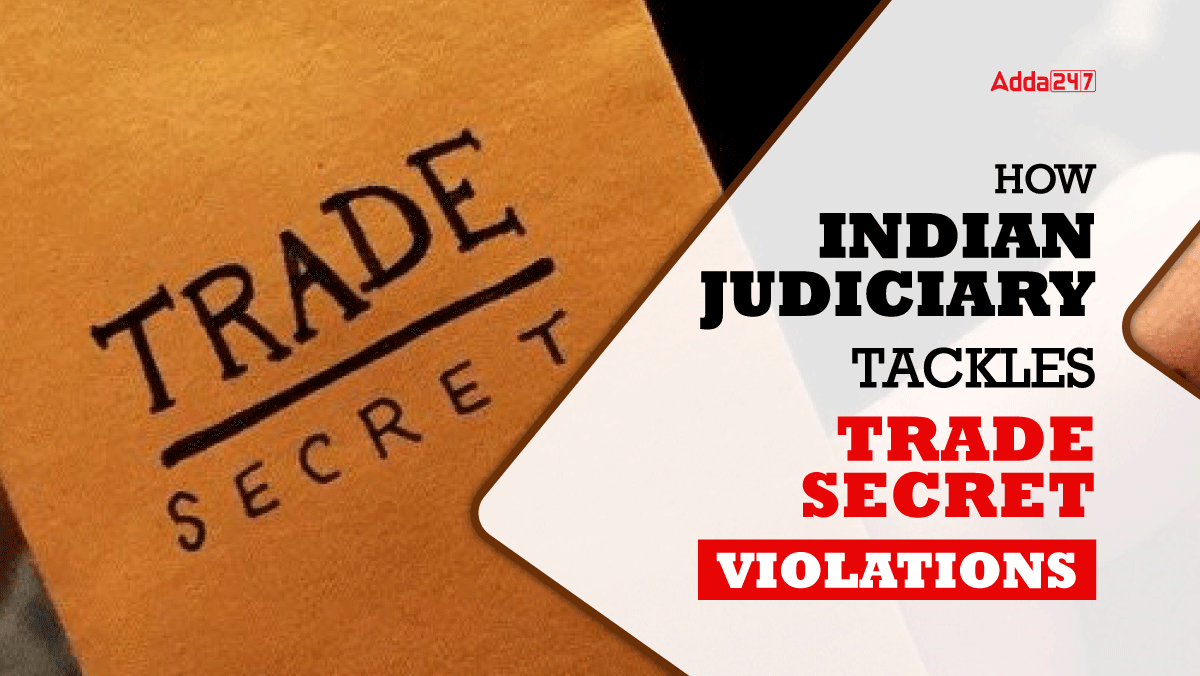Table of Contents
The concept of trade secrets, while less formalized than other forms of intellectual property, plays a crucial role in protecting the proprietary information of businesses. Given the absence of specific legislation governing trade secrets in India, the Judiciary has become the primary arbiter in cases involving trade secret violations. This article explores the nature of trade secret violations in India, the legal framework for their protection, key judicial precedents, types of violations, and challenges faced by the Indian Judiciary. It also highlights protective measures recommended by the Courts to safeguard trade secrets.
What Are Indian Judiciary Trade Secrets Violations?
In the absence of a dedicated Statute for trade secret protection in India, Indian Courts have relied on principles of equity, common law actions like breach of confidence, and contract law to address trade secret violations. The Courts have developed a nuanced understanding of trade secret violations, balancing the interests of businesses and the need for fair competition.
What Are Trade Secrets?
Trade secrets refer to confidential business information that provides a competitive edge. This information includes formulas, processes, designs, and compilations of data that are not generally known to the public. The essence of a trade secret lies in its secrecy and the steps taken by its owner to keep it confidential. A trade secret should have commercial value due to its secrecy, and reasonable measures must be taken by the owner to maintain this secrecy.
Difference Between Trade Secrets and Other IP Rights
Unlike patents, trademarks, and copyrights, which require formal registration for protection, trade secrets do not require any official procedure. Patents protect new inventions but require public disclosure, while trade secrets safeguard information without the need for disclosure. Copyright protects the expression of ideas rather than the underlying idea itself, while trade secrets can include unexpressed information critical to a business.
Legal Framework for Trade Secrets in India
India lacks a specific Statute dedicated to trade secret protection, but Courts have upheld such protection through various laws and doctrines. The Indian Contract Act, 1872, is pivotal, particularly Section 27, which addresses agreements in restraint of trade and allows for restrictive clauses in employment contracts to protect trade secrets. Additionally, Section 72 of the Information Technology Act, 2000, provides limited protection for electronic records. Copyright law can also indirectly protect trade secrets, especially when the confidential information is stored in a literary form such as databases.
Key Judicial Precedents in India
- John Richard Brady v. Chemical Process Equipment Pvt. Ltd. (1987): The Delhi High Court invoked equity principles, granting an injunction to protect technical information shared under an implied confidentiality obligation, even in the absence of a formal contract.
- Mr. Anil Gupta v. Mr. Kunal Dasgupta (2002): The Court emphasized that the unique application of a concept can render it confidential, even if the underlying material is publicly available. The Court granted an injunction to protect the plaintiff’s reality TV concept.
- Homag India Pvt. Ltd. v. Ulfath Ali Khan (2014): The Karnataka High Court ruled that the absence of a contract between Homag India and a third party did not negate Homag’s right to protect its confidential information from being used by the former employee in a competing business.
- Krishna Murugai v. Superintendence Co. of India Pvt. Ltd. (1980): The Supreme Court ruled that while restrictions during employment are permissible, any post-employment restraint must be reasonable and focused on protecting trade secrets.
Types of Trade Secret Violations
Trade secret violations can be broadly classified into the following:
- Employee Misappropriation: When employees misuse confidential information acquired during their employment for personal or competitive advantage.
- Third-Party Inducement: When competitors encourage employees or other entities to disclose trade secrets unlawfully.
- Contractual Breach: When parties bound by a confidentiality agreement, such as vendors or contractors, misuse or disclose confidential information.
- Reverse Engineering and Independent Development: Although not always illegal, these practices can sometimes overlap with trade secret misuse, especially if the reverse engineering is done using unlawfully acquired information.
Challenges Faced by Indian Judiciary in Handling Trade Secret Cases
- Absence of Codified Legislation: The lack of a dedicated trade secret law leads to inconsistent rulings and ambiguity in enforcement.
- Burden of Proof: Plaintiffs must prove that the information was confidential and that reasonable steps were taken to maintain its secrecy. This burden often becomes a significant challenge in Court proceedings.
- Balancing Competing Interests: Courts must balance the need to protect confidential information with the right of employees to utilize their skills and knowledge acquired during employment.
- Enforcement of Injunctions: Implementing interim and permanent injunctions, especially when the information is already partially disclosed, poses practical challenges.
Protective Measures Suggested by Indian Courts
To mitigate the risks of trade secret violations, Indian Courts have recommended the following measures:
- Non-Disclosure Agreements (NDAs): NDAs should be signed with employees, vendors, and other parties to formally bind them to confidentiality obligations.
- Restrictive Covenants in Employment Contracts: Employers are advised to include non-compete and non-solicitation clauses in employment contracts, ensuring they remain reasonable and time-bound to avoid being deemed void under Section 27 of the Indian Contract Act.
- Data Protection Policies: Businesses should adopt robust data protection and information management policies, emphasizing the importance of keeping sensitive information secure.
- Employee Training: Sensitizing employees to the importance of maintaining the confidentiality of trade secrets and the legal implications of breaches can act as a preventive measure.
- Judicial Relief: Seeking judicial relief through interim injunctions and damages in cases of trade secret violations, as demonstrated in Hi-Tech Systems v. Suprabhat Ray (2015), where the Court underscored the role of restrictive covenants during and after employment.
Conclusion
In the absence of a specific trade secret law, the Indian Judiciary has played a crucial role in shaping the protection of trade secrets through its reliance on principles of equity, contract law, and judicial precedents. While this approach has provided some measure of protection, the evolving nature of business and technology demands a dedicated legislative framework. Until such legislation is enacted, businesses must adopt best practices, such as NDAs and data protection policies, to safeguard their trade secrets from potential violations.



 TSPSC Group 1 Question Paper 2024, Downl...
TSPSC Group 1 Question Paper 2024, Downl...
 TSPSC Group 1 Answer key 2024 Out, Downl...
TSPSC Group 1 Answer key 2024 Out, Downl...
 UPSC Prelims 2024 Question Paper, Downlo...
UPSC Prelims 2024 Question Paper, Downlo...





